 21 citations,
August 2003 in “Seminars in oncology nursing”
21 citations,
August 2003 in “Seminars in oncology nursing” Nurses are crucial in managing chemotherapy side effects for ovarian cancer patients to improve their quality of life.
 5 citations,
January 2013 in “Cells Tissues Organs”
5 citations,
January 2013 in “Cells Tissues Organs” Activin B helps start and grow hair follicles in mice.
 28 citations,
March 2014 in “International Journal of Nanomedicine”
28 citations,
March 2014 in “International Journal of Nanomedicine” New lipid nanoparticles show promise for delivering hair loss treatments but need improvement for better skin penetration.
 April 2023 in “Journal of Investigative Dermatology”
April 2023 in “Journal of Investigative Dermatology” Urban pollution and sun exposure speed up skin aging and wrinkle formation in Chinese women, with pollution's effects becoming significant after age 45.
 2 citations,
March 2020 in “Medical journal, Armed Forces India”
2 citations,
March 2020 in “Medical journal, Armed Forces India” Hair transplantation with FUE is safe, effective, and better than FUT for male hair loss.
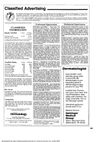 February 1991 in “Archives of Dermatology”
February 1991 in “Archives of Dermatology” The document lists dermatology job ads across the U.S. with good pay and benefits.
 59 citations,
February 2012 in “Journal of Dermatological Science”
59 citations,
February 2012 in “Journal of Dermatological Science” Environmental factors at different levels control hair stem cell activity, which could lead to new hair growth and alopecia treatments.
 19 citations,
December 2021 in “Cureus”
19 citations,
December 2021 in “Cureus” Proxalutamide improved recovery, lowered death rates, and reduced hospital stay for COVID-19 patients.
13 citations,
January 2023 in “Frontiers in Nutrition” Lindera aggregata has many beneficial compounds that can help prevent and manage diseases.
 1 citations,
July 2021 in “Dermatologic Surgery”
1 citations,
July 2021 in “Dermatologic Surgery” Removing the outer layer of skin cells from hair grafts does not change the graft survival rate but may improve how it looks right after surgery.
 4 citations,
February 2020 in “Dermatologic Therapy”
4 citations,
February 2020 in “Dermatologic Therapy” Poor sleep, meat-heavy diets, and junk food worsen hair loss, while sugary drinks may help.
 49 citations,
January 2003 in “Clinical and Experimental Dermatology”
49 citations,
January 2003 in “Clinical and Experimental Dermatology” The document concludes that post-menopausal frontal fibrosing alopecia is a poorly understood condition that does not respond well to common treatments.
 37 citations,
February 2019 in “Experimental Dermatology”
37 citations,
February 2019 in “Experimental Dermatology” Spiny mice are better at regenerating hair after injury than laboratory mice and could help us understand how to improve human skin repair.
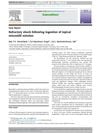 5 citations,
March 2016 in “Medical journal, Armed Forces India”
5 citations,
March 2016 in “Medical journal, Armed Forces India” A man experienced life-threatening shock after swallowing hair growth solution.
December 2018 in “International journal of women’s dermatology” Differences in skin and gut bacteria may contribute to alopecia areata.
 11 citations,
June 2020 in “Dermatologic Therapy”
11 citations,
June 2020 in “Dermatologic Therapy” Combination therapies work better than single treatments for hair loss.
 66 citations,
June 2010 in “Experimental Dermatology”
66 citations,
June 2010 in “Experimental Dermatology” The hair follicle is a great model for research to improve hair growth treatments.
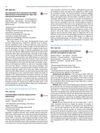 April 2017 in “Journal of Dermatological Science”
April 2017 in “Journal of Dermatological Science” Benzoyl peroxide and adapalene gels work differently to reduce acne in mice.
30 citations,
June 2013 in “Optometry and vision science” Following a specific clinical sequence can help diagnose and treat Demodex mites in the eyes.
 1 citations,
January 2018 in “Stem cell biology and regenerative medicine”
1 citations,
January 2018 in “Stem cell biology and regenerative medicine” DNA methylation is essential for skin and hair follicle development, and could be a target for treating skin diseases.
 92 citations,
August 2017 in “Proceedings of the National Academy of Sciences of the United States of America”
92 citations,
August 2017 in “Proceedings of the National Academy of Sciences of the United States of America” Newborn mouse skin cells can grow hair and this process can be recreated in adult cells to potentially help with hair loss.
 2 citations,
January 2020 in “International Journal of Medical Sciences”
2 citations,
January 2020 in “International Journal of Medical Sciences” Avoid alcohol, ponytails, and oily scalp, and get good sleep to prevent severe hair loss.
 11 citations,
August 2018 in “Medicine”
11 citations,
August 2018 in “Medicine” Hair loss in Chinese college students leads to various psychological issues, so treatment should address both hair loss and mental health.
 3 citations,
January 2022 in “Einstein (São Paulo)”
3 citations,
January 2022 in “Einstein (São Paulo)” The pandemic increased stress-related skin conditions and those affected by behavior changes.
 5 citations,
August 2014 in “Journal of The American Academy of Dermatology”
5 citations,
August 2014 in “Journal of The American Academy of Dermatology” Smoking doesn't cause or prevent Frontal Fibrosing Alopecia, hormonal imbalance may be involved, and a combination of antiandrogens and steroids can help stabilize the condition.
 72 citations,
January 2011 in “Current Pharmaceutical Design”
72 citations,
January 2011 in “Current Pharmaceutical Design” S5αR inhibitors might help treat schizophrenia and other mental disorders but need more research.
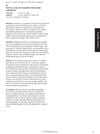 April 2010 in “Plastic and Reconstructive Surgery”
April 2010 in “Plastic and Reconstructive Surgery” The technique can potentially treat hair loss by using a matrix to grow new hair from cells.
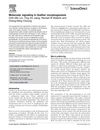 85 citations,
October 2006 in “Current opinion in cell biology”
85 citations,
October 2006 in “Current opinion in cell biology” Feather growth and regeneration involve complex patterns, stem cells, and evolutionary insights.
December 2022 in “Plastic and Reconstructive Surgery” PRPF is a safer and more effective treatment for hair loss than PRP.
 52 citations,
January 1995 in “The Journal of Clinical Endocrinology and Metabolism”
52 citations,
January 1995 in “The Journal of Clinical Endocrinology and Metabolism” Finasteride and spironolactone both reduce hirsutism, but finasteride lowers androgen levels more.


























